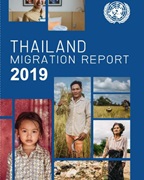
Migrant Health
Despite the efforts of the Royal Thai Government and its partners to address the heath needs of migrants, the challenges remain mainly around five strategic areas:
- lack of a long-term national policy and framework, including coherent policies across line ministries;
- barriers to access health-care services;
- health Information – fragmented migrant health database system;
- health financing – legislation/regulations to unite/ harmonize health financing schemes for migrants, i.e. social security scheme, Compulsory Migrant Health Insurance (CMHI) and governance systems; and
- public health response in crises: lessons learnt from management during the COVID-19 pandemic.
The CCS 2022–2026 includes WHO and its partners’ support to the Royal Thai Government to ensure the right to health and reduce health equity gaps (access to health services with financial protection) in the vulnerable non-Thai populations living in Thailand. Based on the identified gaps, the support will focus on the following three strategic areas:
- create enabling factors to promote health equity of vulnerable non-Thai populations;
- strengthen the migrant health management system; and
- improve health literacy among migrant populations and their communities including in their workplaces
Focus areas
Policy advocacy
- Policy dialogues to strengthen and develop the health system for migrants, to improve collaboration with Cambodia, Laos, Myanmar and Vietnam (CLMV) countries and to improve health literacy
- Technical analysis to provide recommendations for evidence-based policy decisions
- Establishing linkages to support the expansion of UHC to migrants as well as the recommendation for an effective structure within MoPH to ensure coherence in implementation and coordination with stakeholders
- National conferences to inform public policy
- Multi-stakeholders engagement platforms to formulate national policy frameworks
- Networking and social movement
- Support capacity-building of the migrant health network
- Consultative meetings with stakeholders including CLMV countries
- Implementation of network capacity through study visits and workshops aimed at identifying gaps and solutions towards improved health-care accessibility for migrants
- Support capacity-building for local communities and health facilities
- Improvement of health literacy among migrants
- Knowledge generation and social communication through media to counter xenophobia against migrants
Policy research
- Technical analysis to provide recommendations for evidence-based policy decisions
- Areas where there are gaps in knowledge related to migrant health care
Expected outcomes
Coherent policies, legal and regulatory frameworks and improvement of the health management system as well as health literacy among individuals and communities for achieving universal coverage and health equity for migrants and non-national population through the undermentioned steps
- Sustainable partnerships and platforms, both national and international, to support and strengthen health systems to ensure the rights and health equity among migrants and non-national people in Thailand
- Dialogue with governing bodies and stakeholders regarding governmental policies responsible for health inequities
- New networking among non-health partners, such as nongovernmental organizations, academic experts, social and private sector partners at any level to expand coverage of works related to migrants and non-national populations
- Increasing the voice and influence of communities impacted by health inequities in policy change
- Rapid policy analysis and recommendations to support policy dialogue and policy-makers in addressing inequity issues during the time of pandemics
Objectives
- Migrant health To create health equity of migrants and non-national population in Thailand and Thais living abroad, which ultimately will improve their access to health care and provide financial risk protection
- To strengthen migrant health management systems
- To improve health literacy on migrant and non-national health issues
SDGs
16.9: Provide legal identity for all, including birth registration
Reports

Thailand Migration Report 2024

Thailand Migration Report 2019
Related Media
